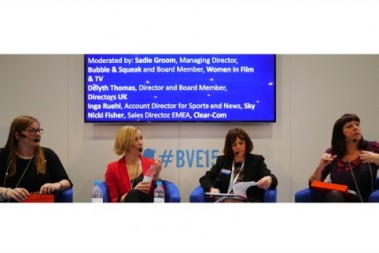Women: Work Hard, Have Fun, Make a Difference
LONDON - The attendees at BVE, which ran Feb. 23 - 26, as with IBC, NAB and countless other broadcast tradeshows, are predominantly male, reflecting the gender imbalance in the industry. The reasons for this and how to address the issue, were examined in a panel discussion hosted by Sadie Groom, managing director of PR firm Bubble and Squeak, and board member of Women in Film and TV. Joining her were Inga Ruehl, account director, sports and news, Sky; Nicki Fisher, sales director EMEA, Clear-Com; and Delyth Thomas, director and board member, Directors UK.

Groom opened light-heartedly by acknowledging the low female footfall at BVE, “there’s no queue for the toilets here and you’ll get into all the parties – so it’s not always a bad thing!” but continued: “My mission is to inspire women, and promote women in this industry.”
One would imagine Ruehl would know all about being outnumbered in the industry, working not only in broadcast, but in the presumably male-dominated world of sports broadcast. Not giving much away, she described her field as “interesting” to work in, though admitted “if you work on the editorial side its much harder, there’s not many women.” Her experience over the past 12 years has been for large corporations and described working for Sky as “insular” rather than “elitist” and, as with any large company in the public eye, “there’s a lot of pressure on promoting females”. Big companies have quotas which must be fulfilled, continued Ruehl, and as such the situation for women “has changed over the past fifteen, twenty years, you can feel it.” Even in the sports industry, she was upbeat: “you’re not the token female, but another female.”
Ruehl’s experience working with Sky put a positive spin on the discussion, as she shared her experience of first landing the job. At the time she was pregnant and only announced the fact at the end of the interview, thinking this would end her chances of getting hired. However, she was offered the job and said, “not everything is great about big corporations, but as a woman, that was an amazing experience” which made her “loyal” towards Sky and, in return, made her feel “supported”.
Fisher also had a positive experience of returning to work after having children, landing a role in a male-dominated area of the industry. Although she conceded, “it was difficult to get back on a technical footing” she triumphed, and gave the advice “you have to be confident in what you do”.
Groom told of the professional obstacles she faced before even having her child. Bring pregnant and still working around five years ago, “about to pop”, she said, her business was losing accounts. The solution to these issues? “We need to educate the men in the industry that we can still do our jobs”. Ruehl’s advice: more women in recruitment positions, who understand the experiences – such as pregnancy – other women may have. “In recruitment the more women you have in those positions the more women you have that are aware”, she said. “If someone’s qualified it doesn’t matter what they’ve done in the past three years.” However, both these solutions – women educating men and more women in recruitment positions – still place the responsibility of addressing the problem with the women.
Not all women will leave employment to have children, and not all who have children will choose to return, so what are the other obstacles women face in the broadcast industry, and why are we still under-represented? Thomas put it down to employment law not meeting employment practice. In big corporations like ITV, the BBC, she said “you’ve got a really good forward thinking policy”, however, this is not always acted upon and there is “no monitoring on the ground”.
Get the TV Tech Newsletter
The professional video industry's #1 source for news, trends and product and tech information. Sign up below.
Another problem identified by the panel was something many women admit to: lack of confidence. Groom looked back to IBC2014, when she was tasked with organizing a similar panel and the (male) IBC CEO took part in the panel as a result of a lack of women applying. Perhaps this is down to some inherent gender differences: Groom commented, “men tend to push themselves even if they’re not very good at something, whereas women will only push themselves if they know they are good at something.” Ruehl admitted, “I don’t like public speaking” though despite this “when I get a chance I sign myself up” and she advised, “the more often you do it the easier it becomes”. Knowledge is also important to confidence, as Ruehl added: “I know my stuff”, and Thomas said of being a director: “you can only do it if you’re confident – you have to know your stuff”.
It seems a dual solution is needed: to engage men, while recognizing the power of standing up for and alongside other women. “It’s about getting more women out there into panels and talking to males about these issues,” said Ruehl. At the same time, building strong relationships can be invaluable. Groom highlighted the particularly popular mentor scheme run by WFTV; Fisher agreed that “having a mentor is really important”; and Thomas stressed that women should “talk to each other, talk to your peers”.
Improvements may be slow coming, but the women on yesterday’s BVE panel demonstrated that there are organizations committed to influencing change. The panel follows from a similar event at IBC, and another is scheduled for NAB in April. This is not an issue which can be solved quickly, but in the meantime, Fisher concluded with the advice “work hard, have fun, and make a difference.”
See original story at TVBEurope.
